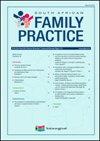Challenges and opportunities in adolescent intellectual disability care and rehabilitation
IF 1.2
Q2 MEDICINE, GENERAL & INTERNAL
引用次数: 0
Abstract
Background There have been mounting concerns over the lack of proper facilities for adolescents living with intellectual disability (ALWID), and the struggles particularly of the developing world to provide care and rehabilitation services for this population. Care and rehabilitation services are needed to improve this population’s normal functioning but have been scarce or non-existent in most communities. Objectives This study aimed to solicit and describe nurse managers’ views of the challenges and opportunities in rendering care and rehabilitation services to ALWID. The study was based on Julian Rappaport’s empowerment theory, which provided a framework for organising essential knowledge while rendering care and rehabilitation services for ALWID. Method A qualitative, explorative design was used to solicit nurse managers’ views of the challenges and opportunities in rendering rehabilitation services to ALWID in Tshwane District, Gauteng province, South Africa. Thirteen participants were purposively selected from three rehabilitation centres. Results Data were analysed thematically using Braun and Clarke’s six-step method. Five themes emerged relating to challenges and opportunities in rendering rehabilitation services to ALWID. Two themes focussed on challenges, namely inadequate age-appropriate rehabilitation services and a lack of material and non-material resources. Strengthened support systems, partnerships with outside stakeholders, and the promotion of physical activities emerged as opportunities for rendering rehabilitation services to ALWID. Conclusion Nurse managers believe rehabilitation services empower ALWID towards autonomy, enhancing their societal function and quality of life with a crucial strong support system. Contribution Nurse managers should lead in creating collaboration platforms for ALWID care, promoting partnerships, sharing best practices, and overcoming challenges in treatment and rehabilitation.青少年智障护理和康复的挑战与机遇
背景 人们越来越关注智障青少年(ALWID)缺乏适当设施的问题,特别是发展中国家在为这一群体提供护理和康复服务方面所面临的困难。需要护理和康复服务来改善这一群体的正常功能,但在大多数社区中,护理和康复服务很少或根本不存在。研究目的 本研究旨在征求和描述护士管理人员对向低龄妇女提供护理和康复服务的挑战和机遇的看法。研究以朱利安-拉帕波特(Julian Rappaport)的赋权理论为基础,该理论提供了一个框架,用于组织为残障人士提供护理和康复服务时的基本知识。研究方法 采用定性、探索性设计,征求护士管理人员对南非豪登省 Tshwane 地区为残障人士提供康复服务所面临的挑战和机遇的看法。从三个康复中心有目的性地挑选了 13 名参与者。结果 采用布劳恩和克拉克的六步法对数据进行了专题分析。得出了五个主题,分别涉及为低龄残疾人士提供康复服务的挑战和机遇。两个主题集中在挑战方面,即适龄康复服务不足以及缺乏物质和非物质资源。在为残障人士提供康复服务方面,加强支援系统、与外界持份者合作及推广体能活动则是机遇所在。结论 护士长认为,康复服务可增强残障人士的自理能力,在强大的支持系统下提高他们的社会功能和生活质量。贡献 护士长应领导建立 ALWID 护理合作平台,促进伙伴关系,分享最佳实践,克服治疗和康复中的挑战。
本文章由计算机程序翻译,如有差异,请以英文原文为准。
求助全文
约1分钟内获得全文
求助全文
来源期刊

South African Family Practice
MEDICINE, GENERAL & INTERNAL-
CiteScore
1.50
自引率
20.00%
发文量
79
审稿时长
25 weeks
期刊介绍:
South African Family Practice (SAFP) is a peer-reviewed scientific journal, which strives to provide primary care physicians and researchers with a broad range of scholarly work in the disciplines of Family Medicine, Primary Health Care, Rural Medicine, District Health and other related fields. SAFP publishes original research, clinical reviews, and pertinent commentary that advance the knowledge base of these disciplines. The content of SAFP is designed to reflect and support further development of the broad basis of these disciplines through original research and critical review of evidence in important clinical areas; as well as to provide practitioners with continuing professional development material.
 求助内容:
求助内容: 应助结果提醒方式:
应助结果提醒方式:


